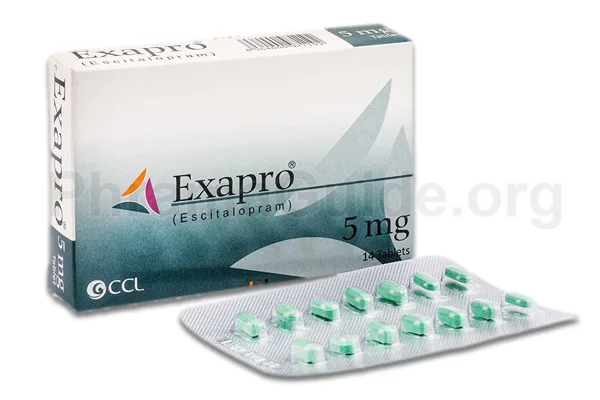Exapro tablet is primarily used to treat major depressive disorder (MDD) and generalized anxiety disorder (GAD). It is an antidepressant medication that belongs to the class of selective serotonin reuptake inhibitors (SSRIs). Following are some common uses of Exapro Tablet:
- Depression: Exapro tablet is commonly used to treat major depressive disorder, a mental health condition characterized by persistent feelings of sadness, hopelessness, and a loss of interest in activities.
- Anxiety Disorders: Exapro tablet is also effective in the treatment of generalized anxiety disorder (GAD), a condition where excessive worry and anxiety interfere with daily life.
- Panic Disorder: Exapro tablets can be used to treat panic disorder, a type of anxiety disorder characterized by recurrent panic attacks, including symptoms such as a racing heart, shortness of breath, and a sense of impending doom.
- Obsessive-Compulsive Disorder (OCD): Exapro tablets may be used for individuals with obsessive-compulsive disorder, a condition characterized by intrusive thoughts (obsessions) and repetitive behaviors (compulsions).
- Social Anxiety Disorder: Exapro tablets can be used for individuals with social anxiety disorder, which involves an intense fear of social situations and a fear of being judged or humiliated.
Off-label Uses of Exapro Tablet
- Post-Traumatic Stress Disorder (PTSD): Exapro tablets may be used off-label to help manage the symptoms of PTSD, such as intrusive thoughts, flashbacks, and hyperarousal.
- Premenstrual Dysphoric Disorder (PMDD): Exapro tablets can sometimes be used to help alleviate the emotional and physical symptoms associated with PMDD, a severe form of premenstrual syndrome.
- Eating Disorders: In some cases, Exapro tablets may be used off-label as an adjunctive treatment for certain eating disorders, such as bulimia nervosa or binge eating disorder, to address underlying anxiety or depressive symptoms.
- Chronic Pain: Exapro tablets might be used to manage chronic pain conditions that are influenced by mood or anxiety disorders, such as fibromyalgia or chronic headaches.
- Insomnia: Exapro tablets can also be used to manage insomnia, particularly when it is associated with depression or anxiety.

What is Exapro?
Exapro is one of the leading brands of Escitalopram, manufactured and marketed by (CCL) Consolidated Chemical Laboratories (Pvt) Ltd, Pakistan.
Exapro Alternatives : Other Similar Brands
The following are some alternative brands of Exapro and their manufacturers.
- Cipralex : Lundbeck Pakistan (Pvt) Ltd.
- Estar : Pharmevo (Pvt) Ltd, Pakistan.
- Citanew : Hilton Pharmaceuticals (Pvt) Ltd, Pakistan.
- Morcet : Searle Pakistan Ltd.
- Prolexa : Genetics Pharmaceuticals, Pakistan.
- Depsit : Genix Pharmaceuticals (Pvt) Ltd, Pakistan.
- Ufrim : High Q Pharmaceuticals, Pakistan.
- Lexapro : Navegal Laboratories.
- Seradep : Barrett Hodgson Pakistan (Pvt) Ltd.
- Zevget : Getz Pharmaceuticals (Pvt) Ltd, Pakistan.
- Questa : Bosch Pharmaceuticals (Pvt) Ltd, Pakistan.
Exapro : Available Formulations and Strengths
Presently, Exapro is available in Tablet Form with the following strengths.
Exapro Tablets : 5mg, 10mg, and 20mg strengths.
Who Should Not Use Exapro?
Exapro has several contraindications, which are specific situations or conditions in which the use of Exapro is not recommended due to potential risks. It’s important to consult with a healthcare professional before taking escitalopram to ensure its safe use.
Hypersensitivity: Individuals who have known hypersensitivity or allergy to Exapro or any of its components should not take the medication.
Monoamine Oxidase Inhibitors (MAOIs): Exapro should not be taken in combination with or within 14 days of discontinuing MAOIs. Concomitant use can lead to a potentially serious condition known as serotonin syndrome, which is characterized by symptoms such as agitation, confusion, rapid heartbeat, tremors, and fever.
Pimozide and Linezolid: Exapro should not be taken in combination with pimozide or linezolid due to the risk of increased cardiac effects.
QT Interval Prolongation: Exapro should be used with caution in individuals with known QT interval prolongation or those who are taking medications that can prolong the QT interval, as it may further increase the risk of abnormal heart rhythms.
Concurrent Use of Serotonergic Agents: Combining Exapro with other serotonergic agents such as other SSRIs, serotonin-norepinephrine reuptake inhibitors (SNRIs), tricyclic antidepressants (TCAs), or certain migraine medications can increase the risk of serotonin syndrome.
Liver or Renal Impairment: Exapro should be used with caution in individuals with severe liver or renal impairment, as the medication’s clearance may be reduced, leading to increased levels in the body.
Bipolar Disorder: Exapro should be used cautiously in individuals with bipolar disorder due to the potential risk of inducing manic episodes.
What is the Recommended Daily Dosage of Exapro?
Exapro Dose for Depression:
- One Tablet of 10mg once daily, which may be increased to a maximum dose of 20mg tablet per day if necessary.
- The starting dose for elderly patients or those with hepatic impairment is usually 5mg tablet per day.
Exapro Dose for Generalized Anxiety Disorder (GAD):
- One Tablet of 10mg once daily, which may be increased to a maximum dose of 20mg tablet per day if needed.
- The starting dose for elderly patients or those with hepatic impairment is usually 5mg tablet per day.
Exapro Dose for Panic Disorder:
- The Initial Dose: One Tablet of 5mg once daily, with the possibility of increasing it to 10mg tablet per day after a week.
- The maximum recommended dose for panic disorder is 20mg tablet per day.
How Exapro Works?
Exapro works by selectively inhibiting the reuptake of serotonin by blocking the serotonin transporter protein. Normally, after serotonin is released into the synapse between nerve cells, it is reabsorbed back into the presynaptic cell through the serotonin transporter. By inhibiting this reuptake process, escitalopram increases the concentration of serotonin in the synaptic gap.

Leave A Comment